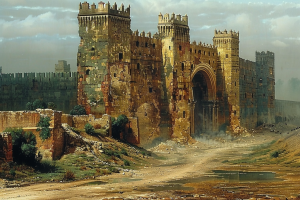Difference between revisions of "Samagolean Wall"
Jump to navigation
Jump to search
Trismegistus (talk | contribs) m |
Trismegistus (talk | contribs) m |
||
| Line 1: | Line 1: | ||
| + | [[File:SamagoleanWallGate.png|thumb|300px|Gate of the ancient Samagolean Wall. Midjourney v6, 2024.]] | ||
| + | |||
A series of immense defensive fortifications built between ca. 680 to 920 (about 240 years), built on the far eastern boundary of the Yophenthean Empire, reaching from the southwest Ambracian Jaggudorns across Asdauria and through the [[Adamantine Mountains]] to the [[Sea of a Thousand Curses]]. Yophentheans used forced and auxiliary labor of [[uhlak]]s and [[giant]]s to construct the great walls and forts. These constructions served to hold off migrating tribes of the steppes, including free [[uhlak]]s, trolls, giants, and humans. | A series of immense defensive fortifications built between ca. 680 to 920 (about 240 years), built on the far eastern boundary of the Yophenthean Empire, reaching from the southwest Ambracian Jaggudorns across Asdauria and through the [[Adamantine Mountains]] to the [[Sea of a Thousand Curses]]. Yophentheans used forced and auxiliary labor of [[uhlak]]s and [[giant]]s to construct the great walls and forts. These constructions served to hold off migrating tribes of the steppes, including free [[uhlak]]s, trolls, giants, and humans. | ||
Latest revision as of 07:39, 8 December 2024
A series of immense defensive fortifications built between ca. 680 to 920 (about 240 years), built on the far eastern boundary of the Yophenthean Empire, reaching from the southwest Ambracian Jaggudorns across Asdauria and through the Adamantine Mountains to the Sea of a Thousand Curses. Yophentheans used forced and auxiliary labor of uhlaks and giants to construct the great walls and forts. These constructions served to hold off migrating tribes of the steppes, including free uhlaks, trolls, giants, and humans.
Today, the ruins of the River-Gates on the Tayhoyre River on the border of the empire stand as a testament to the inevitable scope of collapse.
See Also
| This article is a stub. It requires further development by the creator. |
